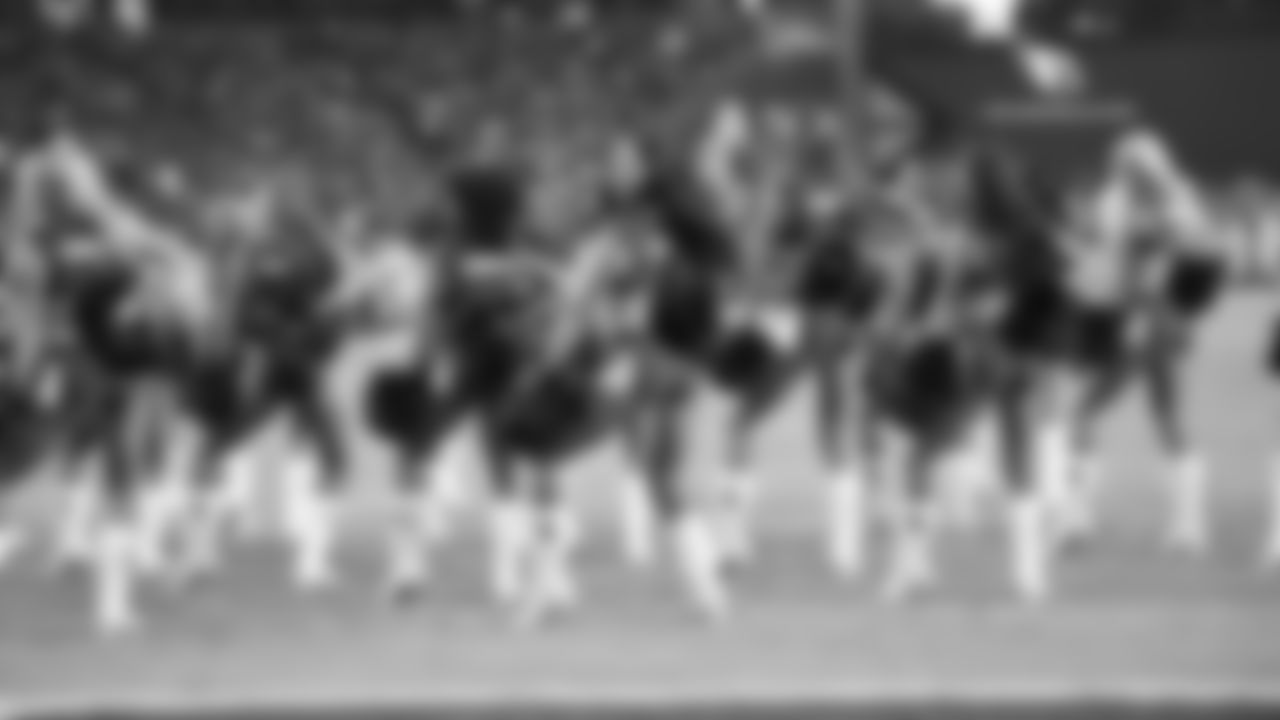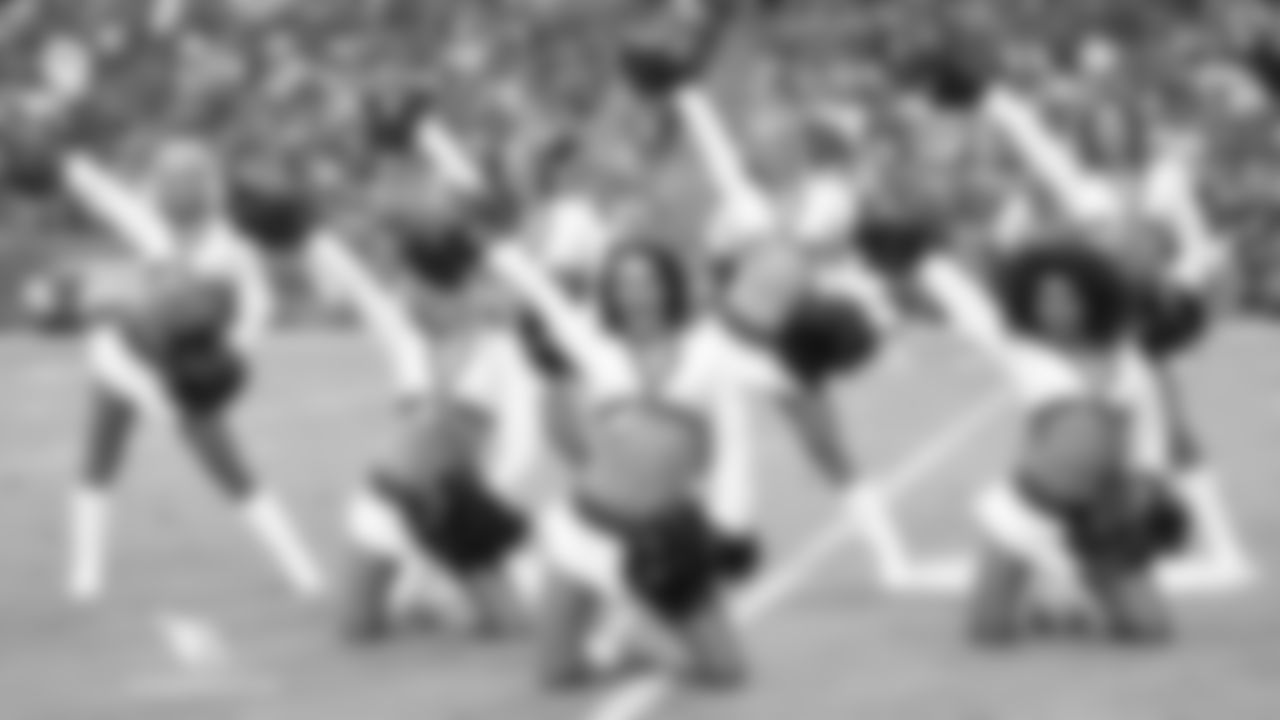Christian Kirk splayed out on the ground for a few extra moments, hoisting both arms into the air as the crowd erupted and teammates mobbed him deliriously in the end zone.
A game-winning touchdown grab is the pinnacle of glory for every NFL receiver, and the Cardinals' rookie deservedly soaked in the adulation on Sunday afternoon.
Kirk's catch to beat the 49ers was the latest in his long line of standout plays this season, as the second-round pick leads the team in receiving yards (410) and yards per reception (13.2) at the midway point.
For those who only get to watch him on game days, it seems like the transition from college to professional football has been smooth as silk. But behind the curtain, Kirk has made key adjustments, including one spurred by his all-pro cornerback teammate Patrick Peterson.
"When you go against a guy like Pat, who is the best in the league, it's a chess match," Kirk said. "When he sees something I do well and excel at and he knows how to expose it, he's going to expose it."
It's easy for attention to wane during the monotony of training camp, especially during the sweltering outside practices, but Peterson was locked in during one such session in early August.
He noticed that Kirk would regularly use a skip step at the line of scrimmage, a hesitation move that helps read the coverage for a split-second before the start of a route. Peterson barked out the tendency to all the other defensive backs, imploring them to be aggressive in press coverage.
On that day, Peterson and the other cornerbacks made Kirk pay if he slow-played off the line.
"The two times in camp that he jump-jammed me, it was good for me to learn," Kirk said. "At the end of the day, it wasn't like it was anything personal. He was trying to help me get better. That meant a lot to me, the fact he was willing to do it."
The NFL's offseason rules forbid major contact until minicamp, so it gives rookies a soft landing upon arrival. But once the restrictions are off, it's a new ballgame. Success or failure then comes down to the technical details that don't matter as much in the college game.
"That's why they're always scoring 60 points (in college)," offensive coordinator Byron Leftwich said. "They're just going. They're holding up cards with pictures of Batman on the sideline, and they're just going fast. … That's college, but in this league it's a little different. You're not going out there and getting 60 every week, so it's the little things that are very important."
In order to succeed, Kirk knew he had to be more diverse with his releases off the line of scrimmage. He watched film intently to figure out an antidote.
"In training camp, you're going against these guys for, shoot, 20 practices in a row," Kirk said. "You can't give a guy the same move two days in a row, or try to do that all camp, because they're going to catch on to it."
Once the season began, the cat-and-mouse game shifted to actual opponents, where the difference between a clean release and a jammed one can be monumental. Each week, the Cardinals wide receivers get a hefty scouting report on the tendencies of every defensive back they face.
"We always talk about, 'What does this DB like to do? What are his weaknesses and what are his strengths?'" rookie wide receiver Trent Sherfield said. "We're always adding things to our toolbox. We'll have different moves for guys. If a guy is a soft presser, we'll have moves for him. If a guy is a hard presser, we'll have a move for him."
Rest assured, the defensive backs have the same intel on the wide receivers, and any poor tendencies will be targeted. In the regular season, Kirk has mostly relied on a speed release to get down the field quickly, but that doesn't mean the skip step is dead.
"You always have to have a plan coming to the line of scrimmage, and it's just a changeup," Kirk said. "It depends on the route and situation. Just a slight bit of hesitation gives me more time to see how he's going to react, if he's going to stick a hand on me. If he wants to put hands on me, then I know I have to speed up my route. If he's going to backpedal, then I can work my route and be more patient."
Kirk's ability to evolve should serve him well in the future. He is likely to get more attention from top cornerbacks as his star rises, and Kirk said he has already leaned on the experience of battling against Peterson.
Those practice matchups aren't as prevalent now because the offense usually faces the scout team, but they haven't disappeared completely.
"We get an opportunity to go ones versus ones on our Wednesday practice to start off the day," Kirk said. "We have six plays to go against one another, and I get to go against him the majority of the time. It's great for me because I'm going against one of the best corners in the league. We're making each other better."
Images of the Cardinals cheerleaders during the Week 8 matchup vs. San Francisco

Images of the Cardinals cheerleaders during the Week 8 matchup vs. San Francisco

Images of the Cardinals cheerleaders during the Week 8 matchup vs. San Francisco

Images of the Cardinals cheerleaders during the Week 8 matchup vs. San Francisco

Images of the Cardinals cheerleaders during the Week 8 matchup vs. San Francisco

Images of the Cardinals cheerleaders during the Week 8 matchup vs. San Francisco

Images of the Cardinals cheerleaders during the Week 8 matchup vs. San Francisco

Images of the Cardinals cheerleaders during the Week 8 matchup vs. San Francisco

Images of the Cardinals cheerleaders during the Week 8 matchup vs. San Francisco

Images of the Cardinals cheerleaders during the Week 8 matchup vs. San Francisco

Images of the Cardinals cheerleaders during the Week 8 matchup vs. San Francisco

Images of the Cardinals cheerleaders during the Week 8 matchup vs. San Francisco

Images of the Cardinals cheerleaders during the Week 8 matchup vs. San Francisco

Images of the Cardinals cheerleaders during the Week 8 matchup vs. San Francisco

Images of the Cardinals cheerleaders during the Week 8 matchup vs. San Francisco

Images of the Cardinals cheerleaders during the Week 8 matchup vs. San Francisco

Images of the Cardinals cheerleaders during the Week 8 matchup vs. San Francisco

Images of the Cardinals cheerleaders during the Week 8 matchup vs. San Francisco

Images of the Cardinals cheerleaders during the Week 8 matchup vs. San Francisco

Images of the Cardinals cheerleaders during the Week 8 matchup vs. San Francisco

Images of the Cardinals cheerleaders during the Week 8 matchup vs. San Francisco

Images of the Cardinals cheerleaders during the Week 8 matchup vs. San Francisco

Images of the Cardinals cheerleaders during the Week 8 matchup vs. San Francisco

Images of the Cardinals cheerleaders during the Week 8 matchup vs. San Francisco

Images of the Cardinals cheerleaders during the Week 8 matchup vs. San Francisco

Images of the Cardinals cheerleaders during the Week 8 matchup vs. San Francisco

Images of the Cardinals cheerleaders during the Week 8 matchup vs. San Francisco

Images of the Cardinals cheerleaders during the Week 8 matchup vs. San Francisco

Images of the Cardinals cheerleaders during the Week 8 matchup vs. San Francisco

Images of the Cardinals cheerleaders during the Week 8 matchup vs. San Francisco

Images of the Cardinals cheerleaders during the Week 8 matchup vs. San Francisco

Images of the Cardinals cheerleaders during the Week 8 matchup vs. San Francisco

Images of the Cardinals cheerleaders during the Week 8 matchup vs. San Francisco

Images of the Cardinals cheerleaders during the Week 8 matchup vs. San Francisco

Images of the Cardinals cheerleaders during the Week 8 matchup vs. San Francisco

Images of the Cardinals cheerleaders during the Week 8 matchup vs. San Francisco

Images of the Cardinals cheerleaders during the Week 8 matchup vs. San Francisco

Images of the Cardinals cheerleaders during the Week 8 matchup vs. San Francisco

Images of the Cardinals cheerleaders during the Week 8 matchup vs. San Francisco

Images of the Cardinals cheerleaders during the Week 8 matchup vs. San Francisco

Images of the Cardinals cheerleaders during the Week 8 matchup vs. San Francisco

Images of the Cardinals cheerleaders during the Week 8 matchup vs. San Francisco

Images of the Cardinals cheerleaders during the Week 8 matchup vs. San Francisco

Images of the Cardinals cheerleaders during the Week 8 matchup vs. San Francisco

Images of the Cardinals cheerleaders during the Week 8 matchup vs. San Francisco

Images of the Cardinals cheerleaders during the Week 8 matchup vs. San Francisco

Images of the Cardinals cheerleaders during the Week 8 matchup vs. San Francisco

Images of the Cardinals cheerleaders during the Week 8 matchup vs. San Francisco

Images of the Cardinals cheerleaders during the Week 8 matchup vs. San Francisco

Images of the Cardinals cheerleaders during the Week 8 matchup vs. San Francisco

Images of the Cardinals cheerleaders during the Week 8 matchup vs. San Francisco

Images of the Cardinals cheerleaders during the Week 8 matchup vs. San Francisco

Images of the Cardinals cheerleaders during the Week 8 matchup vs. San Francisco

Images of the Cardinals cheerleaders during the Week 8 matchup vs. San Francisco

Images of the Cardinals cheerleaders during the Week 8 matchup vs. San Francisco

Images of the Cardinals cheerleaders during the Week 8 matchup vs. San Francisco

Images of the Cardinals cheerleaders during the Week 8 matchup vs. San Francisco

Images of the Cardinals cheerleaders during the Week 8 matchup vs. San Francisco

Images of the Cardinals cheerleaders during the Week 8 matchup vs. San Francisco

Images of the Cardinals cheerleaders during the Week 8 matchup vs. San Francisco

Images of the Cardinals cheerleaders during the Week 8 matchup vs. San Francisco

Images of the Cardinals cheerleaders during the Week 8 matchup vs. San Francisco

Images of the Cardinals cheerleaders during the Week 8 matchup vs. San Francisco

Images of the Cardinals cheerleaders during the Week 8 matchup vs. San Francisco

Images of the Cardinals cheerleaders during the Week 8 matchup vs. San Francisco

Images of the Cardinals cheerleaders during the Week 8 matchup vs. San Francisco

Images of the Cardinals cheerleaders during the Week 8 matchup vs. San Francisco

Images of the Cardinals cheerleaders during the Week 8 matchup vs. San Francisco

Images of the Cardinals cheerleaders during the Week 8 matchup vs. San Francisco

Images of the Cardinals cheerleaders during the Week 8 matchup vs. San Francisco

Images of the Cardinals cheerleaders during the Week 8 matchup vs. San Francisco

Images of the Cardinals cheerleaders during the Week 8 matchup vs. San Francisco

Images of the Cardinals cheerleaders during the Week 8 matchup vs. San Francisco

Images of the Cardinals cheerleaders during the Week 8 matchup vs. San Francisco

Images of the Cardinals cheerleaders during the Week 8 matchup vs. San Francisco

Images of the Cardinals cheerleaders during the Week 8 matchup vs. San Francisco

Images of the Cardinals cheerleaders during the Week 8 matchup vs. San Francisco

Images of the Cardinals cheerleaders during the Week 8 matchup vs. San Francisco

Images of the Cardinals cheerleaders during the Week 8 matchup vs. San Francisco















